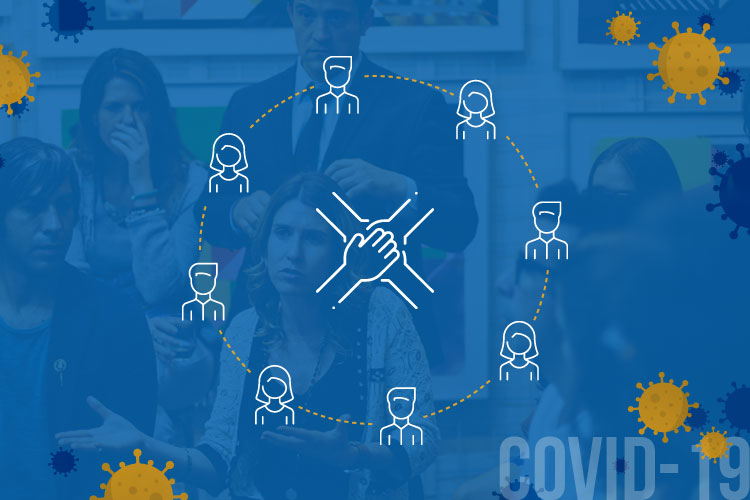There is a saying that we often use in our participatory processes: if you decide for me, without me, you are deciding against me. Paradoxically, this feeling prevails even when what is decided is logical or reasonable. The saying illustrates, in our opinion, the current debate on what has been called co-governance in the management of COVID-19.
Governance represents, in its most basic interpretation, how we organise ourselves to make decisions. The debate on co-governance has emerged around how the European institutions, the Spanish Government and the autonomous communities organise themselves to make decisions in the face of the COVID-19 crisis, and this is the focus of our reflection. However, it is important to point out that the debate on multilevel governance has implications far beyond this pandemic and will also be critical in addressing the major transitions (including digital, socio-demographic and those of climate change).
The Basque Country Competitiveness Report 2011 stated that in the Basque Country there was an open debate on the need for new models of governance that were "more participatory and permeable", and that there were structures (formal organisations) created with this mandate, but that we needed to develop processes that would bring them to life.
In 2014, Orkestra made a methodological proposal to bring these structures to life. We assumed complexity as the result, not exclusively of the existence of many actors, but of their conflicts of interest. Even though there are many, if we all wanted the same thing, it would not be difficult to make decisions together. Thus, we argue that collaborative governance is based not only on participants' knowledge of a situation, but also on processes of conflict management. We learned:
- that collaborative governance does not build itself, and that it is necessary for some territorial actors to assume the facilitation of these processes.
- we understood that the construction of collaborative governance requires specially prepared spaces to learn together and negotiate,
- that only through these learning and negotiation processes can the conditions to decide and act together be generated,
- we also concluded that multilevel governance, that is, involving governments of different levels in the decision process, is contextual, which in other words means there is no ideal model that serves everyone.
It is through the lens of these learnings that we now look at the resurgence of the debate on co-governance, or the need to jointly decide on the management of COVID-19. Thus, from what we learned during these years at Orkestra, we share our reflections on the governance of COVID-19 management.
The crisis is impacting different countries and regions asymmetrically, since they have a different economic and social structure. Therefore, efficient management of the crisis requires models of governance and policies that are adapted to the specific impacts in each context. As a result, a debate has arisen as to whether a centralised or decentralised model is the best way to deal with this crisis.
Our learnings on the contextual nature of governance lead us to respond that it is artificial to pose this dilemma as if the governance of COVID-19 is somethings we can choose, regardless of the decision-making mechanisms we already have. It is not the same to consider governance in the face of a pandemic in a country like France, with a centralised model, or in Germany, with a more decentralised one. The virus is the same, but the governance for responding to the crisis it has generated cannot be the same. This has opened a debate at the international level on the relevance of the regions (in our case autonomous communities) when it comes to responding to the asymmetric impacts of the crisis.
This crisis has three main axes, health, social and economic, in which the capacity of decision and action are distributed. In the case of Spain, not only between the Spanish Government and the autonomous communities, but also between the European institutions and the sub-regional governments. The most efficient governance is that which guarantees, through collaboration, that those who are best prepared to articulate the solutions to the crisis can decide and act. Normally, those who are best prepared to tackle a problem are those who already have that competence (and therefore experience) and governance should be oriented towards collaboration and coordination, but without taking over. Impersonation can lead to inefficiencies by not maximising the use of existing knowledge on impacts and possible crisis response mechanisms and capacities in each context. Multilevel governance, the need to clarify competencies and to define an inter-institutional model is a challenge in all countries and regions of Europe.
The difficulties that have become apparent in recent weeks regarding collaboration between European institutions, the central government and the autonomous communities, and the consequent doubts about the efficiency of collaborative governance in the face of other more unilateral governments do not respond to our opinion that the collaborative model is not efficient, but rather that the machinery for collaboration was rusty. It is not a matter of a day's work to fine-tune this, because building the spaces for learning and negotiation, making conflicts explicit, negotiating, and recognising each other's legitimacy to decide are processes that take time. Time is precisely what is lacking in the face of a crisis; however, this should not lead us to discard collaborative governance, but to work faster to fine-tune it. This is going to be one of the keys to making recovery in the health, social and economic spheres more agile and solid and to cushioning the effects of the crisis for each and every one of us who make up this society.

Mari Jose Aranguren
Mari Jose Aranguren is the General Director at Orkestra and Professor in Economics at Deusto University. She has worked at Orkestra since its beginning in 2006. Mari Jose is a recognised expert in the area of competitiveness and territorial strategy, cluster and networks, and the analysis and evaluation of policies, having published several books and articles in specialised national and international journals of impact.

Miren Larrea
Miren Larrea is Senior Researcher at Orkestra. She began her professional career as a research assistant at the University of Deusto, where she wrote her doctoral thesis on the local production systems of the Basque Country. After a decade dedicated to teaching and research, she worked for six years at a local development agency, where she combined her experience as a regional development professional with her work as a university researcher.













